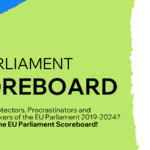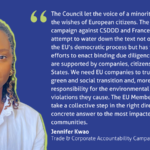Today the European Commission has published its recommendations for improving the draft National Energy and Climate Plans wherein EU Member States have to draw concrete pathways to reduce their greenhouse gas emissions and boost energy savings as well as renewable energy all the way until 2030. Member States have until the end of this year to come up with better deals for the climate.
The recommendations by the European Commission address some major shortcomings, which Climate Action Network (CAN) Europe had also identified in its reports “Time to pick up the pace: Insights into the draft national energy and climate plans” and “Just transition or just talk?”.
According to the European Commission, the main gaps lie in the insufficient ambition of the national energy and climate targets for 2030 and the lack of informed policies and measures to scale up renewable energy and energy savings and phase out fossil fuel subsidies. Also missing are concrete plans to implement a just transition in order to support the regions and communities affected by the energy transition.
From now until the end of this year, Member States have time to finalise their plans and incorporate these recommendations in order to improve them. Those plans should set clear pathways to shift away from fossil fuels and promote the rapid development of sustainable energy at the scale needed to steep emissions cuts as soon as possible.
This is all the more feasible as the costs of renewable energy technologies keep falling and are expected to fall even more in the next decade, making fossil fuels increasingly unprofitable*. And this is all the more necessary given that in absence of more substantial action, the economic losses linked to climate change events will keep increasing to the detriment of the people and the economy of Europe.
Implementing the recommendations of the Commission is just the starting point. Member States should see the current EU’s 2030 climate and energy targets as a baseline that they must overshoot in order to allow the bloc to stick to its engagement under the Paris Agreement to limit temperature rise to 1.5°C.
Wendel Trio, Director of Climate Action Network (CAN) Europe, said:
“Planning for the future we want starts today. In the next months EU Member States must implement the recommendations from the Commission and set out concrete pathways to reduce emissions and transform their energy systems in line with the Paris Agreement. The more decarbonised European economies get by 2030, the more likely the European Union will be able to achieve net-zero emissions and thus prevent dangerous climate change.”
ENDS
Contact:
Nicolas Derobert, CAN Europe Communications Coordinator, nicolas@caneurope.org, +32 483 62 18 88
Note to editors:
* A recent analysis from the International Renewable Energy Agency concluded that onshore wind and solar PV will soon offer less expensive electricity than any fossil-fuel option, without financial assistance. (Irena, 2019. Renewable power generation costs in 2018).
Climate Action Network (CAN) Europe is Europe’s leading NGO coalition fighting dangerous climate change. With over 160 member organisations from 35 European countries, representing over 1.700 NGOs and more than 47 million citizens, CAN Europe promotes sustainable climate, energy and development policies throughout Europe.


